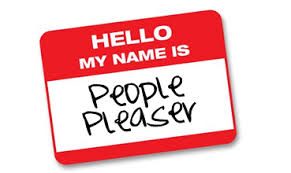Are you a people-pleaser?
We all want approval. We want our partners to think we’re attractive and funny, we want our bosses to think we’re intelligent and hard-working, we want our friends to think we’re fun and dependable, we want our children to think we’re cool parents…and the list goes on. It’s perfectly normal to want to be seen in a positive light, but for some people, approval-seeking can become an automatic and unaviodable behaviour that severely impairs one’s functioning and well-being. This might sound familiar to you because it’s something that you’re currently struggling with, or it might be a problem that you’ve noticed in others. Either way, it’s important to recognize when approval-seeking has become an oft-used crutch, and to take steps to reduce this maladaptive behaviour. As Bob Marley said, “you can fool some people sometimes, but you can’t fool everybody all the time”. The same goes for pleasing people – sooner or later, one of your approval-seeking attempts will inevitably fail, and you won’t feel very good about yourself.
At this point, you may be wondering, how can you tell whether approval-seeking is a problem in your own life? Some potential clues to watch out for include extreme anxiety at the thought of any potential conflict or disapproval from others, altering your own opinions or behaviour because you perceive that someone disapproves, acting contrary to your values and beliefs in order to please others, apologizing excessively, and finding yourself afraid to say ‘no’ to any request made of you.
On a clinical level, approval-seeking can sometimes be indicative of an underlying diagnosis of generalized anxiety disorder, but more commonly, the behaviour can stem from many different roots such as childhood bullying or insecure attachment. Approval-seeking behaviour, many argue, is learned rather than inherent; therefore, it can also be ‘un-learned’. If you feel that this behaviour may be a problem in your own life, there are a few strategies that you can employ to try to reduce it:
Start by identifying: Are you aware of when you’re engaging in approval-seeking behaviour? Sometimes, this behaviour can manifest in rather obvious ways (for example, doing things that you don’t want to do in order to gain approval), while other times, it may appear more subtly (for example, you might find yourself paying someone an insincere compliment). Dedicate a few days to paying close attention to your own behaviour – don’t judge or criticize yourself, simply notice the patterns that emerge. Pay attention to your own thought processes, and try to identify the areas of life (or the specific social situations) in which you tend to seek approval.
Move on to questioning: Now that you’ve identified where your approval-seeking manifests, you can move on to the harder work: questioning why you’ve been engaging in these behaviours. The reasons may not always be clear – as mentioned earlier, approval-seeking often originates as a result of childhood experiences that you may not recall completely – but just do your best. For example, if you find yourself spending your Friday night at a club with your friends even though you’re exhausted and were dying to spend the evening curled up on the couch with popcorn and a movie, ask yourself why you went out. Were you scared that your friends would be disappointed in you if you bailed? And if they were disappointed in you, what would happen then? Take the time to really interrogate your own beliefs and motivations – you might gain a lot of insight.
Tell everyone: If you feel comfortable, try explaining your quest to decrease approval-seeking to your friends and family. Saying something like “I’ve noticed that people-pleasing behaviour has become a problem for me, and I’ve decided to work on it – so you might notice me saying no to things more than usual” can go a long way in setting the social stage for your behaviour change. If your friends have been forewarned that you might say no to their requests sometimes, you might just feel more comfortable doing so. If they truly care about you, they’ll almost certainly understand. If you want to take it a (brave) step further, you can even try asking your loved ones to point out to you when they notice you seeking approval. This last tactic runs the risk of hurting your feelings, however, so make sure to be cognizant of that.
Engage in self-care: You’ve been worrying yourself sick about pleasing other people, so it’s likely that you haven’t given much thought to taking good care of yourself. Try using the time you gain back as a result of decreasing your approval-seeking to engage in some good old-fashioned self care. Queue up your favourite Netflix show, sink into a hot bath, catch up with your significant other, read a book, plan a trip, or do all of the above – just make sure to take time for yourself to fully relax, and turn off your phone while you do so!
As always, it’s important to consider the valuable and often-neglected option of sourcing the help of a Psychologist to help you examine the reasons behind your approval-seeking behaviour and help you work to reduce said behaviour. Above all, remember to be kind and patient with yourself when you’re trying to reduce approval-seeking behaviour. This kind of big behavioural change definitely doesn’t occur overnight, and for many of us, this behaviour has been with us since childhood, so treat yourself with kindness and appreciate the small victories. You’re doing something good for yourself just by reading this article – and before you know it, you’ll be enjoying a new sense of control over your life and toasting to your people-pleasing past.








